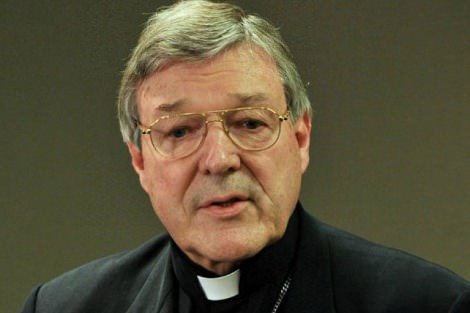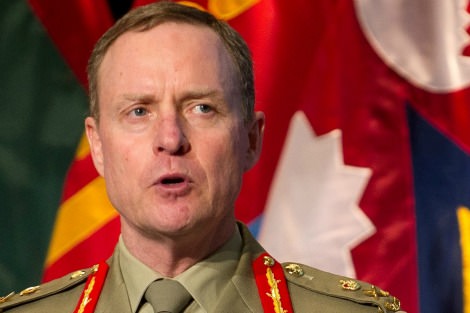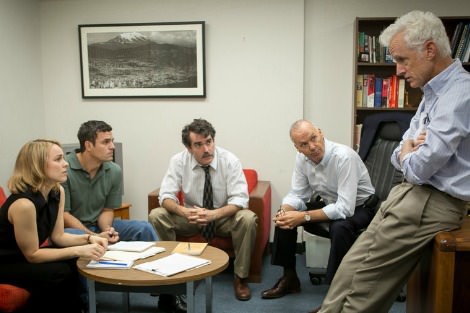Keywords: Church Sex Abuse
-

RELIGION
- Frank Brennan
- 23 February 2016
47 Comments
McClellan and his fellow commissioners on the Royal Commission into Institutional Responses to Child Sexual Abuse have a daunting task in the next fortnight, according due process and natural justice to a high profile witness on the other side of the world who has been publicly labeled 'scum', 'buffoon' and a 'coward', being the subject of unauthorised leaks about uninvestigated complaints from a police service which itself is under scrutiny for its past cooperation with the witness and his Church.
READ MORE 
-

AUSTRALIA
- Donella Johnston
- 17 February 2016
18 Comments
The movement to end violence against women needs men in positions of influence, such as Australian of the Year David Morrison, to add their voices to those of the women spearheading the campaign. Male religious leaders can play an important role, but must first confront an important question: if one of the key causes of family violence is gender inequality, can they speak with authority if they are part of an institution that has no women episcopal decision-makers or leaders?
READ MORE 
-

ARTS AND CULTURE
- Richard Leonard
- 28 January 2016
18 Comments
This is one of the angriest films you will ever see. In the Bible we hear about righteous anger, where God or humanity realises something is so wrong and sinful that 'holy anger' is the first and right response. At its best in the scriptures this anger leads to justice, making things right. Spotlight is an occasion for holy, righteous anger and every adult Catholic should see it.
READ MORE 
-

ARTS AND CULTURE
- Jim McDermott
- 28 January 2016
4 Comments
Not long ago a priest visiting from abroad told me that the story of Spotlight doesn't really apply to his country. 'We don't have that problem here.' It's a comment you get somewhat regularly from some parts of the world. Would that it could only be true. Without a much greater willingness on the part of the institutional Church to let itself be broken and changed by what we have learned since January of 2002, it's more likely a sign of disasters still to come.
READ MORE 
-

RELIGION
- Moira Rayner
- 14 December 2015
48 Comments
There is a culture of brotherhood in the upper echelons of the Church. There is also a natural urge to homosocial reproduction in its instrumentalities. If I have learned anything from my work with companies and organisations on cultural change, it is that these comfortable cultures need to be broken up, because they are readily corrupted. The best way to change a culture is to start giving women positions of real influence and respect. They are outsiders, and outsiders see what insiders cannot.
READ MORE 
-

AUSTRALIA
- Frank Brennan
- 10 December 2015
I first met this Tony on my regular visits here to Darwin when he was working at the North Australian Aboriginal Legal Aid Service and then when he set up the mediation services under the auspices of Anglicare. In later years I knew him when he was your Anti-Discrimination Commissioner. He was a quiet, considered, gentle, strong and principled man. On Human Rights Day, it is only fitting that I honour Tony by offering some reflections on the architecture for human rights in Australia, on the contemporary human rights controversies, and on the way forward for better protection of the human rights of Aborigines and asylum seekers, two marginalised groups who had a special claim on Tony's sympathies.
READ MORE
-

RELIGION
- Frank Brennan
- 04 December 2015
1 Comment
'Tonight, gathered here in the Southern Cross Club in the national capital, gathered as Eureka's children. We affirm that there is room for everyone under the Southern Cross. I hope you will return to Canberra carrying the Southern Cross flag when we proclaim the Australia Republic on 1 January 2020 which will be two elections after Australia last had a monarchist leader of a major political party. Tony Abbott is the last of his type. Whether the prime minister honoured to witness the proclamation is Malcolm Turnbull, Bill Shorten or another matters not.' Annual Dinner for Eureka's Children, Southern Cross Club, Canberra, 3 December 2015.
READ MORE
-

RELIGION
- Frank Brennan
- 30 November 2015
6 Comments
'No one doubts the pastoral sensitivity of Pope Francis. But the Church will continue to suffer for as long as it does not engage in open, ongoing discussion and education about the issue of women's leadership. The official position is no longer comprehensible to most people of good will, and not even those at the very top of the hierarchy have a willingness or capacity to explain it.' - Fr Frank Brennan SJ outlines five challenges and opportunities for the Catholic Church in the 21st century.
READ MORE
-

RELIGION
- Frank Brennan
- 27 November 2015
2 Comments
'The crisis of child sexual abuse in our societies has required that our institutional procedures be more transparent and that we learn from the ways of the world in exercising power openly and justly. This means we have to restructure some of our church arrangements so that power is exercised accountably and transparently. All of us who have positions of influence and power in institutional churches need to be attentive to the voices of those who have suffered within our institutions.' 'Discerning the place for the prophetic voice and pragmatic cooperation of the churches in the great moral questions of the age', address to the Association of Practical Theology in Oceania conference, 26 November 2015.
READ MORE
-

RELIGION
- Frank Brennan
- 24 November 2015
46 Comments
Last week the Herald Sun reported: 'Victims of child sexual abuse look set to be grilled by lawyers for Pell in a bid to quash explosive allegations he was complicit in a widespread cover-up.' As the Royal Commission into Institutional Responses to Child Sexual Abuse recommences its case study on the Catholic Church in Ballarat, it's only fair Pell have his lawyers cross examine these victims. His reputation is on the line and the commission has spared no effort in scrutinising his past actions.
READ MORE 
-

AUSTRALIA
- Frank Brennan
- 23 October 2015
4 Comments
Francis knows there are all sorts of issues inside and outside the Church where for too long people with power have tried to keep the lid on, in the hope that the problems and complexities will go away, often by parodying those who see the problems or complexities as small 'l' liberals or cafeteria Catholics. He delights in being joyful and troubled while contemplating big problems, calling people of good will to the table of deliberation reminding them of the kernel of the Christian gospels. He has the faith and hope needed to lift the lid without fear and without knowing the answers prior to the dialogue occurring.
READ MORE
-

- Frank Brennan
- 18 September 2015
Pope Francis's concerns are not narrowly dogmatic or pedagogical but universally pastoral. He knows that millions of people, including erstwhile Catholics, are now suspicious of or not helped by notions of tradition, authority, ritual and community when it comes to their own spiritual growth which is now more individual and eclectic. He wants to step beyond the Church's perceived lack of authenticity and its moral focus on individual matters, more often than not, sexual. He thinks the world is in a mess particularly with the state of the planet — climate change, loss of biodiversity and water shortages, but also with the oppression of the poor whose life basics are not assured by the operation of the free market, and with the clutter and violence of lives which are cheated the opportunity for interior peace. He is going to great pains to demystify his office. He wants all people of good will to emulate him and to be both joyful and troubled as they wrestle with the probl
READ MORE